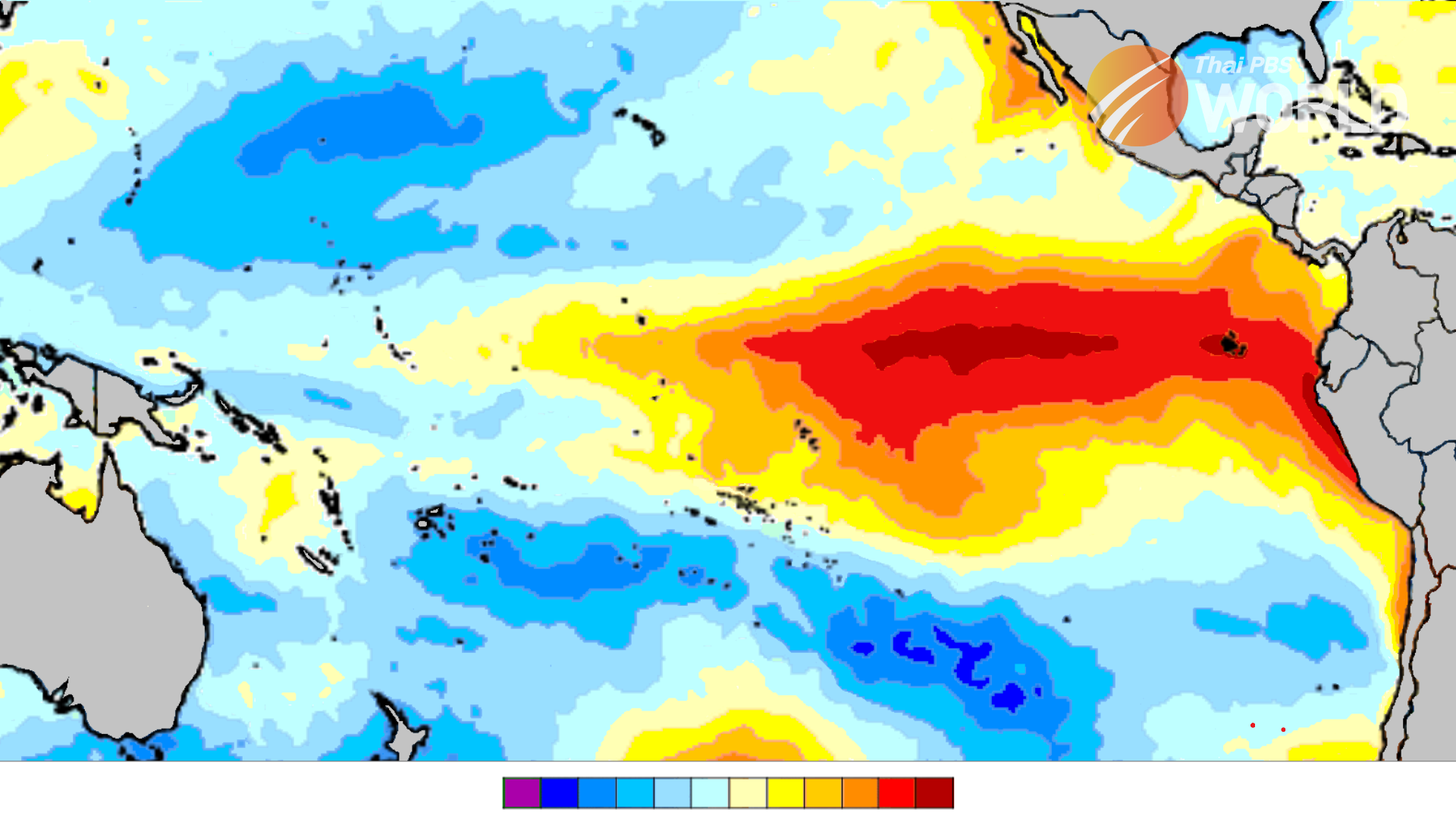El Nino will expose Thailand’s lack of defense against climate change: experts

Although the rainy season has begun in Thailand, the threat of prolonged drought and water shortages is hovering on the horizon because of El Nino.
The US National Oceanic and Atmospheric Administration (NOAA), which monitors sea temperatures at over 200 locations, forecasts that El Nino – a change in the weather system that increases global temperatures – will drag on from now until at least February next year.
Coupled with global warming, El Nino means Thailand must prepare for a longer dry season, more frequent hot days, and drought. Hardest hit will be Thailand’s East and South.
Worst scenario: Double El Nino
Dr Thon Thamrongnawasawat, deputy dean of Kasetsart University’s Faculty of Fisheries, confirms that El Nino has already arrived.
On Facebook he explained that the rainy season in Thailand’s North, Northeast and Central regions usually has two phases. “This year, the first phase has already ended and rainfall was 20% lower than normal,” he said.
With the latter phase due to start around the middle of August, it remains unclear how much water the country will be able to store for the coming dry season.
But the academic is convinced that the constraints on water supply will lead to lower agricultural yields for thirsty crops such as rice and sugarcane.
“Forecasts suggest Thai farmers’ income will fall by 5%,” Thon said.
According to SCB Economic Intelligence Center (EIC), the El Nino-driven drought will cause more than 40 billion baht in losses for Thailand’s agricultural sector. Paddy fields that grow rice for the year’s second crop look set to bear the brunt. In a worst-case scenario, damages may rise to 63 billion baht.
Farmers at risk
Thai Mueangthum, a 56-year-old rice farmer in Khon Kaen, has continued working in his paddy fields as usual despite hearing warnings about El Nino.
“It’s not that I am ignoring warnings, I just don’t know what I need to do. So, I am doing what I have always done for the past three decades,” he said.
The Royal Irrigation Department released water from its dams for paddy fields in April and May. That means rice fields in the first cropping season this year may be spared water shortages. But farmers who plant rice for the second crop risk seeing their plants wither as the effects of El Nino take a toll.
Chaowalit Simsuay, who heads Buriram Rajabhat University’s Research and Development Institute, said most farmers likely think that the El Nino warnings are about usual drought and so they are going ahead with their normal practices.
In Uthai Thani province, water supplies are already running low and local farmers are becoming worried. For example, water in the local dyke of Khlong Pho has dropped to a fraction of its normal level, with just 1.06 million cubic meters left to distribute to local farmland.
Manop Naruekhon, a rice farmer in Uthai Thani, said he had invested more than 20,000 baht to prepare and plant his 19-rai paddy field and was now praying that rain would come.
“I use water pumps but there is hardly any water to pump now,” he said.
Proactive approach needed
Chaowalit complained that authorities were too passive in handling water management, because the usual warnings and advice would not help farmers this time.
“The situation has changed. If the government uses the same old approach, damage will be unavoidable,” he said.
Assoc Prof Witsanu Attavanich, a lecturer at Kasetsart University’s Faculty of Economics and an expert in climate change, agriculture, environment and food security, said El Nino may last from seven to 19 months.
“So, we can’t really tell if El Nino will end by early next year. If the ongoing El Nino is long-lasting, it may be with us till 2025,” he said grimly.
Only 30 million of Thailand’s 150 million rai of farmland are within irrigated zones, he said.
Therefore, even if the Royal Irrigation Department manages water resources to support the agricultural sector, farmers outside irrigated zones will be pretty much on their own.
“Many farmers have dug wells and ponds to store water for use during the dry season. But with El Nino, the dry season may last for a really long time and they risk not having enough water for farming,” the university lecturer explained.
Witsanu said the government should take a proactive approach by educating and supporting farmers. Issuing warnings without offering guidance about what farmers should do is not enough.
“It’s going to be difficult for farmers to adjust and adapt on their own. They need guidelines and support,” Witsanu said.
He also cautioned against the use of populist schemes such as crop-price guarantees or income-guarantee pledges, saying they would only prevent farmers from adapting to changing situations.
“Without proper adjustments, the damage will just be bigger and the government will end up having to pay more,” he said. “We will see better results if the government encourages farmers to adapt and develop immunity to climate-change impacts.”
Worthy of national agenda
Witsanu said climate-change issues should have been placed on the national agenda long ago because they impact not just agriculture but every other sector too.
“People’s health is affected and so are businesses,” he explained.
He said businesses whose workers need to work outdoors may need to reduce working hours because long exposure to hot temperatures can lead to injuries and illness. The tourism industry may also falter as ecosystems break down from the effects of environmental warming.
The lecturer said that while populist policies might make politicians popular, they could threaten the national interest.
Instead, government agencies must work together on the issue, he added.
“Work plans should be integrated to combat climate change. At present, ministries still work separately on climate-change management.”
He also expressed concern that climate-change issues were still given low priority by many ministries because executives, whose tenure usually ranged from just two to four years, focused on tasks that could deliver tangible results faster than climate-change management efforts.
Witsanu added that Thailand still lacks research on plants and livestock affected by global warming. Without this research, the country cannot formulate efficient policies to handle the effects of climate change.
“It’s high time the government paid serious attention to climate change and adjusted its approach,” he concluded.
By Thai PBS World






